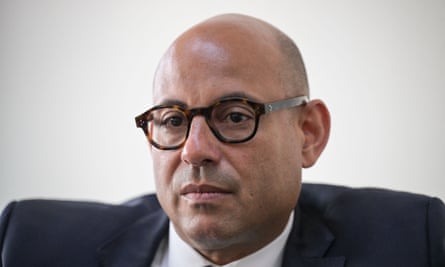World leaders must “stop dawdling and start doing” on carbon emission cuts, as rapidly rising temperatures this year have put everyone on the frontline of disaster, the UN’s top climate official has warned.
No country could think itself immune from catastrophe, said Simon Stiell, who will oversee the crucial Cop28 climate summit that begins next week. Scores of world leaders will arrive in Dubai for tense talks on how to tackle the crisis.
“We’re used to talking about protecting people on the far-flung frontlines. We’re now at the point where we’re all on the frontline,” said Stiell, speaking exclusively to the Guardian before the summit. “Yet most governments are still strolling when they need to be sprinting.”
Global temperatures have broken new records in recent months, making this year the hottest on record, and perilously close to the threshold of 1.5C above pre-industrial levels that countries have agreed to hold to. Temperatures are now heading for a “hellish” 3C increase, unless urgent and drastic action is taken, but greenhouse gas emissions have continued to rise.
Stiell said it was still possible to cut greenhouse gas emissions enough to stay within the crucial limit, but that further delay would be dangerous.
“Every year of the baby steps we’ve been taking up to this point means that we need to be taking … bigger leaps with each following year if we are to stay in this race,” he said. “The science is absolutely clear.”
The fortnight-long Cop28 talks will start this Thursday in Dubai, hosted by the United Arab Emirates, a major oil and gas-producing country. Scores of world leaders, senior ministers and officials from 198 countries will be in attendance, along with an estimated 70,000 delegates, making it the biggest annual conference of the parties (Cop) yet held under the 1992 UN framework convention on climate change.
The UK prime minister, Rishi Sunak, is expected to attend, and King Charles will give the opening speech, along with the UN secretary general, António Guterres, and the UAE president, Mohammed bin Zayed al-Nahyan. The pope will also be there, the European Commission president, Ursula von der Leyen, and an invitation has been extended to Bashar al-Assad, the president of Syria.
The presidents of the world’s two biggest greenhouse gas emitters, Joe Biden of the US and Xi Jinping of China, are not expected to attend, but their envoys John Kerry and Xie Zhenhua have signalled their close cooperation before the talks.
Sultan Al Jaber, the chief of the UAE national oil company, Adnoc, will preside over the talks. Al Jaber has come under fierce criticism from green campaigners for his dual role, but Stiell said this was “a distraction”.

“This is not the first Cop to be hosted by a fossil fuel producing nation and it certainly won’t be the last. Every country, even those that are major oil producers, have their role to play,” he said. “What’s important are the messages and the signals that the incoming president is giving, and they speak to the need for urgent action and a focus on the how – how do we speed up the transition to a new decarbonised world.”
Fossil fuel executives are likely to be out in force at the summit, as they have been an increasing presence at Cops in recent years.
Stiell said: “It’s important that we recognise that the fossil fuel industry has to be part of the solution. We know where the problems lie. But in order to progress the conversation from what needs to be done to how it needs to be done, the fossil fuel industry has to be part of the conversation.”
after newsletter promotion
But he insisted these companies had to show they were serious about shifting the world to a zero-carbon economy. “Their engagement in the process has to be legitimate, has to be speaking to the necessary actions that are taking the transition away from our current dependence on fossil fuels to a new decarbonised business model,” he said.
One of the key issues at Cop28 will be the provision of finance for the rescue and rehabilitation of the poorest and most vulnerable communities when they are stricken with climate disaster. The absence of this loss and damage funding has been a longstanding grievance for developing countries, but earlier this month countries agreed a blueprint for the fund.
Rich countries have yet to pledge contributions to the fund, however. Stiell called on world leaders to come with pledges. “A fund that is established without the resources capitalised won’t get us to where we need to be. That opportunity, for donors to send strong signals as to how the fund will be capitalised, and the scale of that capitalisation, is on offer at this Cop,” he said.
Governments will be presented with a global assessment of how little progress has been made on emissions cuts since the 2015 Paris agreement, and how far off track the world is to meet the Paris goal of limiting global heating to 1.5C, beyond which scientists warn the impacts of the climate crisis will rapidly become catastrophic and irreversible.
Stiell said governments must list and deploy the “solutions, solutions, solutions” that they know will be effective, such as renewable energy, electrifying transport and decarbonising the global economy. “People everywhere expect governments to put these tools at work at Cop28. Public attention will be on us, and the expectations that this Cop will speak to those solutions and the urgency of action.”
He said: “We keep talking about hope, but hope can only be established if there are signs of delivery, of action. I believe that is the signal that ordinary people struggling to deal with the consequences of climate change are expecting of world leaders here at Cop28.”
